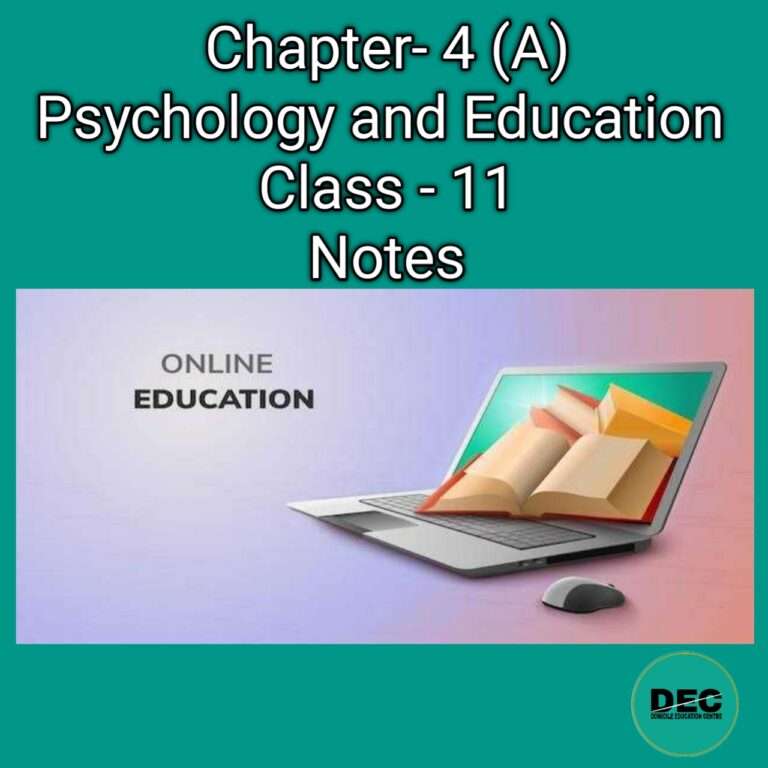Important Questions Answer
1. State how the word “Psychology” has been originated.
Ans: The word “Psychology” has been originated from two ‘Greek’ words ‘Psyche’ and ‘logos’. Psyche means ‘soul’ and Logos means ‘science of’. Thus the meaning of psychology is the soul.
2. Who said, “ First psychology lost its soul, then it lost its mind, then its consciousness, it still has behaviour of kind”?
Ans: Woodworth.
3. Why psychology is called the ‘science of behaviour’?
Ans: Psychology is called the science of behaviour because behaviour is the outer expression of our inner mind so by observing behaviour, we can understand the functioning of the mind of an individual. Behaviour includes the study of human mind and its three level – conscious, unconscious and sub-conscious.
4. Who said, “Psychology is a positive science of behaviour”?
Ans: J.B. Watson.
5. Why psychology is called a positive science?
Ans: Psychology is the study of human behaviour which is exhibited in a given situation. It tries to make an objective study of behaviour by using the method of direct observation and experimentation to deal with the present matter of fact. That is why, psychology is called a positive science.
6. What are branches of Psychology? Explain any two of them.
Ans: There are various branches of psychology which are mentioned below:
(a) Biological psychology.
(b) Developmental psychology.
(c) Environmental psychology.
(d) Clinical psychology.
(e) Child psychology.
(f) Educational psychology, etc.
Now, we are going to discuss briefly any of them in the following below:
(a) Biological Psychology:
Biological psychology is that branch of psychology which is studies the influence of physical environmental condition such as temperature, pollution, humidity, natural disaster etc. on human behaviour.
(b) Developmental psychology:
Developmental psychology is that branch which make studies a detailed of human being in different ages and stages of human life from conception to death. Here, all the aspects of human behaviour includes like- physical, mental, social, emotional, motor, language, etc.
7. Make two difference between Education and Psychology.
Ans: The two difference between Education and Psychology are mention below:
(a) Education is a normative science. On the other hand, Psychology is an objective or positive science.
(b) Education is based on philosophy. On the other hand, Psychology is based on experience.
Archives
8. Scope of psychology is very wider – Justify the statement.
Ans: Of course, the scope of psychology is becoming wider day by day. Because psychology studies all aspects of human life which has its own scope of studies that are highlighted below:
(i) It primarily studies causes of behaviour that includes physical, motor, mental, intellectual, and emotional activities.
(ii) It studies nature of behaviour in human being.
(iii) It takes into account human experiences that involves cognition, conation and affection.
(iv) It studies both consciousness and unconsciousness aspects of mind in its scope.
(v) It also studies many branches like developmental psychology, educational psychology, child psychology, clinical psychology, etc.
9. “ Education and psychology are not contradictory but complementary” Explain the statement.
Ans: Yes, Education and psychology are not contradictory but complementary each other we can say in the following ways:
(i) Education helps psychology in actual application of psychological findings.
(ii) Psychology also helps education in its practices and in solving different problems related to school environment and students.
(iii) Psychology makes educational norms, aims or goals in a reality.
(iv) Education contributes a lot towards widening the scope of psychology.
(v) Education also helps in developing several new branches of psychology like child psychology, educational psychology, developmental psychology, etc.
Thus, it may be observed that there is sustaining relationship between education and psychology that one can not survive as a branch of study without the help of the other.
10. What is child psychology?
Ans: Child psychology is a branch of psychology which deals with the behavioural development of children as he grows. The child is different from an adult so far his emotion, sentiments, urges and intelligence is concerned. Therefore, the child psychology helps their behaviour to be studied separately in accordance with their problem.
11. What is Clinical Psychology?
Ans: Clinical psychology is a branch of psychology which deals with causes, treatment and prevention of various psychological disorders in individual which helps individual in solving the challenges and problems of their individual life.
12. What do you mean by social psychology or Group psychology?
Ans: Social psychology is a branch of psychology which is studies the behaviour of an individual as a member of a group like- interpersonal relationship, cooperation, obedience to leaders, prejudice, aggression, social motivation, intergroup relation, etc. on the environment of the society.
13. What is Educational Psychology?
Ans: Educational psychology is nothing but it is regarded as the most important branch of applied psychology. It studies the educational problems with reference to the facts of psychology. It also deals with the problems of the individuals in the educational situation.
14. Definition of Educational psychology.
Ans: (i) According to Skinner, “Educational psychology covers the entire range of behaviour and personality as related to education”.
(ii) Again, Skinner said, “Educational psychology is that branch of psychology which deals with teaching and learning”.
15. Who is the father of Educational psychology?
Ans: A Swiss school teacher, Heinrich Pestalozzi is the father of educational psychology.
16. Mention three characteristics of Educational psychology.
Ans: The three characteristics of Educational psychology are mention below:
(i) Educational psychology as an applied branch of psychology applies the principles of psychology to study the behaviour of the children in learning situation.
(ii) It helps a teacher to solve the various problems that arise in a classroom situation.
(iii) It suggest the ways and means for the modification of the behaviour of the children.
17. Discuss about the scope of educational psychology.
Ans: The scope of educational psychology is very broad. It combines two fields education and psychology. Its scope can be broadly classified from the point of view of the key factors which are mentioned below:
(i) The learner:
Learner means the child who is involve in the process of learning. Every learner has his unique qualities and potentialities. Hence, one important area of educational psychology is to study the nature, and behaviour of the learner in its relation to education.
(ii) Individual differences:
Every child is different from the other by birth with his genetic qualities. So education has to be designed according to the needs, interest and attitudes of a child. Study of such individual is a major areas of study of educational psychology.
(iii) Stages of Development:
Every child passes through various stages of development before reaching maturity. Every stage of development has its own nature and characteristics. Educational psychology makes an analytical study of the nature of the psycho-physical development of the child.
(iv) Study of unconscious mind:
Educational psychology also attempts to make a study of the complexity of our unconscious mind and the role its plays in our day to day life.
Apart from all these, the scope of educational psychology also includes the following:
(v) Developmental characteristics.
(vi) A study of pupils behaviour.
(vii) Methods of teaching and learning.
(viii) Measurement and Evaluation.
(ix) Heredity and Environment.
(x) The teacher.
(xi) The learning process.
(xii) The learning experiences, Etc.
18. Mention two differences between general psychology and educational psychology.
Ans: The basic of difference between educational psychology and general psychology are as follows:
(i) General psychology is more theoretical, whereas educational psychology is practical.
(ii) General psychology is an old branch of study, but educational psychology is comparatively new.
(iii) The scope of general psychology is wider than educational psychology.
19. Discuss in brief why study of psychology is essential for a Teacher.
Ans: Relevance of psychology for the teacher may be clear with the following consideration:
(i) Understanding the child’s nature:
Child mind has it’s own nature so that teacher may know this better through the study of psychology.
(ii) Knowledge of child’s behaviour:
It is professional responsibility of the teacher to know the child’s native potential before he goes to teach. So that study of psychology is the way out for him.
(iii) Modification of child’s behaviour:
Teacher should bring about changes in the native instinctive tendencies and biological needs of children through study of this subject.
(iv) Creating interest and motivation:
Teacher is not teach but to create condition for self-learning of the students, here also study of psychology is of great help to him.
(v) To develop suitable method of teaching:
Teacher may be helped to evolve effective method of teaching through study of psychology.
(vi) To know about classroom situation:
Teacher may know the social structure and group behaviour of the students through study of psychology.
Point to be Remember
- Psychology was first defined as science of soul.
- During 18th century psychology was defined as the science of mind.
- Modern and formal definition that is accepted today psychology as a ‘science of behaviour’.
Related Post Just Click Here : Part-II Educational Psychology and its Significance.
Class- 11 | Education | Notes |
Class-11 | Education | Question Paper |
Calendar of Content List:
| M | T | W | T | F | S | S |
|---|---|---|---|---|---|---|
| 1 | ||||||
| 2 | 3 | 4 | 5 | 6 | 7 | 8 |
| 9 | 10 | 11 | 12 | 13 | 14 | 15 |
| 16 | 17 | 18 | 19 | 20 | 21 | 22 |
| 23 | 24 | 25 | 26 | 27 | 28 | |


Recent Comments